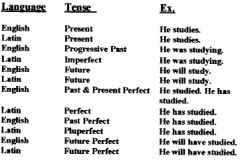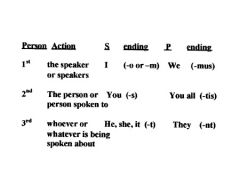![]()
![]()
![]()
Use LEFT and RIGHT arrow keys to navigate between flashcards;
Use UP and DOWN arrow keys to flip the card;
H to show hint;
A reads text to speech;
30 Cards in this Set
- Front
- Back
|
Predicate Nominative
Definition |
A noun used in the predicate after a linking verb to complete its meaning.
Noun S Pred N The province is Gaul. |
|
|
Transitive Verbs
Definition |
Verbs that require a direct object to complete the thought
Ex. Lisa carries a book. |
|
|
Intransitive Verbs
Definition |
Verbs that do not require a direct object to complete the thought.
Ex. The car stopped. |
|
|
Voice
Definition |
Voice tells us whether the subject is doing the action or receiving the action described by the verb.
|
|
|
Active Voice
Definition |
Active Voice tells us the subject is doing the action.
Ex. Tracy sang the song. |
|
|
Passive Voice
Definition |
Passive Voice tells us the subject is receiving the action.
Ex. A song was sung by Tracy. |
|
|
Mood
Definition |
Mood indicates the manner in which a statement is made.
|
|
|
Indicative Mood
Definition |
Indicative Mood states a fact or asks a question.
Ex. The dog chews on a bone. Or Do you like to swim? |
|
|
Imperative Mood
Definition |
Imperative Mood gives a command or makes a request.
Ex. Sit down! Or Please give the note to your mother. |
|
|
Subjunctive Mood
Definition |
Subjunctive Mood expresses an action or condition that is not reality.
Ex. I wish you were here. Or If I were you, I’d hurry home. |
|
|
Verb Tenses
Grammar |

|
|
|
Person
Definition |

|
|
|
Verb Agreement
Grammar |
English- Present TenseS
imple- he sings Progressive- he is singing Emphatic- he does sing Latin- a verb must agree with its subject in number & person. Ex. The girl looks at the forest. Puella silvam pectant. The women are inging. Feminae cantant. |
|
|
Direct Object
Grammar |
Direct Object- noun that receives the action of a verb. It answers the question whom or what after the verb.
Ex. Julie threw a ball. D.O.–accusative case 1st P Acc. S We carry water Aquam portamus. 3rd S Acc. S He praises the farmer. Agricolam laudat. |
|
|
ambulo, ambulare, ambulavi, ambulatus
|
walk
amble |
|
|
amo, amare, amvi, amatus
|
love, like
amorous |
|
|
do, dare, dedi, datus
|
give
|
|
|
canto, cantare, cantatus
|
sing
cantata |
|
|
laboro, laborare, laboravi, laboratus
|
labor, suffer, work, am hard pressed
|
|
|
laudo, laudare, laudavi, laudatus
|
praise
laud |
|
|
navigo, navigare, navigavi, navigatus
|
sail
navigate |
|
|
paro, parare, paravi, paratus
|
prepare, prepare for
|
|
|
occupo, occupare, occupavi, occupatus
|
seize, capture
occupy |
|
|
porto, portare, portavi, portatus
|
carry
portable |
|
|
pugno, pugnare, pugnavi, pugnatus
|
fight
pugnacious |
|
|
specto, spectare, spectavi, spectatus
|
look at, watch
spectator |
|
|
non (adverb)
|
not
|
|
|
voco, vocare, vocavi, vocatus
|
call
vocal |
|
|
et (conjunction)
|
and
|
|
|
sed (conjunction)
|
but
|

